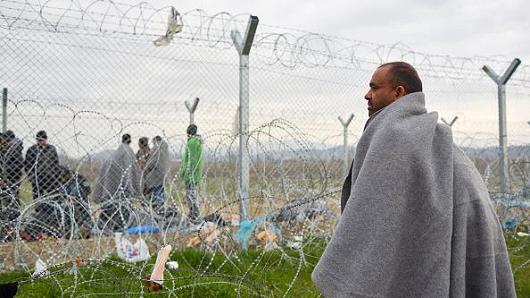-
Tips for becoming a good boxer - November 6, 2020
-
7 expert tips for making your hens night a memorable one - November 6, 2020
-
5 reasons to host your Christmas party on a cruise boat - November 6, 2020
-
What to do when you’re charged with a crime - November 6, 2020
-
Should you get one or multiple dogs? Here’s all you need to know - November 3, 2020
-
A Guide: How to Build Your Very Own Magic Mirror - February 14, 2019
-
Our Top Inspirational Baseball Stars - November 24, 2018
-
Five Tech Tools That Will Help You Turn Your Blog into a Business - November 24, 2018
-
How to Indulge on Vacation without Expanding Your Waist - November 9, 2018
-
5 Strategies for Businesses to Appeal to Today’s Increasingly Mobile-Crazed Customers - November 9, 2018
6500 refugees stuck on Greek-Macedonian border, 300 let in
At least 22,000 refugees and migrants have been stranded in Greece in the past week since border restrictions began along other countries in the Balkan corridor used by individuals to get to central and northern Europe. No arrests or injuries were reported.
Advertisement
Migrants mass on the Greek-Macedonian on February 28, 2016. Greece is fast becoming the…
Thousands of refugees have been stuck for days on the Greek side of the border as they wait for Macedonian authorities to let them continue their trek through the Balkans.
Macedonian President Gjorge Ivanov on Monday said that the Balkan refugee route will have to close once Austria shuts its border to more migrants, a decision he warned could be imminent.
The refugees, including women and children, had earlier charged past Greek police to reach the gate, shouting, “Open the border!”
Macedonian police repelled the protesters.
The group was pushed back after some broke through a fence at the border and one officer was injured, national police spokeswoman Dejana Nedeljkovic said by phone from Skopje on Monday.
The crossing has been closed since 4am on Monday, when a total of 300 Syrian and Iraqi refugees were allowed over the border after it opened at 11pm on Sunday night.
The spate of border closures was sparked by Austria’s announcement it would accept no more than 80 asylum claims per day and cap the numbers of those seeking to cross its territory, in a move Merkel said was responsible for the current buildup.
More than one million migrants passed through Greece a year ago, prompting criticism from other European nations that Athens simply waved people through.
In France, authorities the northwestern port city of Calais, on February 29 started dismantling a large refugee camp known as “The Jungle”.
An estimated 8,000 people, said to be mostly Syrians and Iraqis, have now gathered at the frontier at Idomeni.
“It was very cold”.
Merkel said of eastern European countries that have tightened their border controls: “The problem is that they acted independently and unilaterally, but it’s not good if a country is not involved”. The situation created by Macedonia’s decision has seen refugees forced to sleep in the open and wait hours to use the bathroom or receive food and water.
Greece, under intense pressure from anxious European Union partners, has erected extra reception centres on the Greek islands near Turkey, where thousands of migrants have been arriving daily. Hungary has fenced off its southern border and refuses to take in any non-EU migrants.
“We will not accept the transformation of our country to a permanent warehouse for human beings, while at the same time we continue to operate in Europe and at summit meetings as if nothing is happening”, Greek Prime Minister Alexis Tsipras said last week.
She has insisted that Germany can cope with the influx – and has a humanitarian duty to look after war refugees.
“This is exactly what I fear: When one country defines its border, another must suffer. That is not my Europe”.
But Austria’s deputy chancellor, Reinhold Mitterlehner, said Monday the refugee restrictions “are necessary (and) we’re going to maintain them”.
Accidents are frequent as dozens cram into unseaworthy boats provided for a high price by smuggling gangs.
“Frustration has accumulated because for several days some of these people have been blocked at the Greek border”, he told Reuters.
Greek authorities have suspended media access to all migrant registration and transit camps in the country, citing overcrowding in the facilities.
Advertisement
The port’s passenger terminals, which have been converted into an informal temporary accommodation center since the weekend, are overwhelmed with refugees.





























